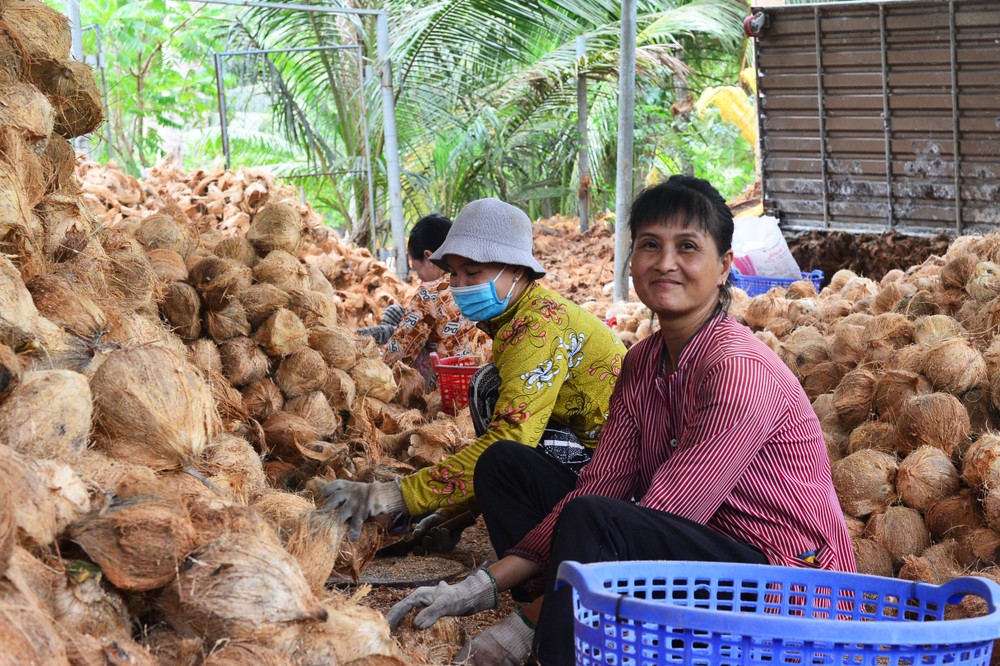
Across the Mekong Delta provinces, the price of dried coconuts has reached a peak of over VND200,000 per dozen, with Ben Tre Province at the forefront of this trend. Being recognized as ‘coconut capital’ of both the Mekong Delta and the country, Ben Tre Province has successfully cultivated its coconut trees into a vital multi-faceted industrial crop, thereby significantly contributing to the growth of its local economy.
These days in Ben Tre, the coconut land, the prices of coconut is a hot topic. From quiet village paths to bustling markets and even relaxed coffee shops, local people have all talked about coconut prices.
Resident Tran Van Luong with nickname Tu Luong in Dinh Thuy Commune of Mo Cay Nam District, a man whose life has been intertwined with coconut trees for nearly 70 years, was so delighted saying that he has lived alongside coconuts for his whole life, but this is the first time he has witnessed prices as remarkably high as they are now.
Old farmer Tu Luong explained that this region experiences alternating fresh and saltwater conditions over the course of the year, making it challenging to grow other crops besides coconuts. While no one has become a coconut billionaire, the hardy coconut palm has helped many local farmers lift themselves out of poverty, allowing entire households to prosper.
Director Tran Van Dat of Dinh Thuy Agricultural Cooperative shared that coconut trees are often referred to as ‘a tree help people escape poverty escape’ because they offer a relatively stable source of income. While not necessarily making growers wealthy, participation in the cooperative’s organic coconut production chain—such as by farmer Tu Luong—ensures stable output, consistently higher purchase prices compared to the market, and an overall improvement in members' livelihoods.
Director Dat noted that since its founding, the cooperative has created employment opportunities for many local residents. Managing over 530 hectares of organic coconut plantations, the cooperative requires substantial labor for various stages of production, from peeling to crushing coconut shells. Ms. Tran Thi Phan, a coconut peeler at Dinh Thuy Agricultural Cooperative, shared that whereas her family once struggled financially, she now earns over VND1.5 million per week—enough to comfortably support her household and children.
In Mo Cay Nam District, everyone all know Mr. Nguyen Van Lung of Dinh Thuy Commune with nickname Bay Dua as he is the first person in the commune to participate in the Cooperative's organic coconut farming model, a system integrated with Luong Quoi Coconut Company. His impressive coconut garden covers more than ten hectares, a testament to his dedication, with a healthy mix of mature, productive trees alongside younger saplings approaching their third year.
Sharing his experience with organic coconut farming, Mr. Bay explained that he uses compost made from dry coconut leaves mixed with young mud, applying fertilizer once a year and adjusting as needed based on conditions. This method not only reduces costs but also improves soil aeration, promoting healthy and robust coconut growth. According to him, participating in the organic coconut production chain not only guarantees a higher purchase price compared to the market but also ensures stable output. This stability enables businesses to proactively produce and process for export orders, while helping farmers secure a steady income.
Director of Dinh Thuy Agricultural Cooperative Tran Van Dat revealed that compared to traditional coconut farming, the organic coconut model has significantly enhanced the industry's value chain. Since adopting organic production, the cooperative has received technical support and secured stable output through partnerships with purchasing companies. Currently, the cooperative supplies approximately 150,000 coconuts per week, enabling businesses to proactively process products, increase value, and improve members’ livelihoods, Director Dat emphasized.
Deputy Director Huynh Quang Duc of the Department of Agriculture and Environment of Ben Tre Province added that the province now has 32 cooperatives and 28 production groups engaged in the coconut value chain, covering a total of 6,404 hectares and involving nearly 7,000 members. Organic coconut farming now represents 22 percent of Ben Tre’s total coconut cultivation area. Furthermore, the province has developed six concentrated coconut production zones, five of which meet organic standards, with one dedicated to coconut water production.
According to Chairman of Ben Tre Provincial People's Committee Tran Ngoc Tam, the province identifies coconut as one of the key industrial crops; therefore, local authorities prioritize creating policies and mechanisms to attract investment and promote the application of science and technology in coconut production and processing. This aligns with meeting domestic consumption demands and accessing international markets.
Therefore, the total export turnover of coconut in 2024 reached more than US$451 million, an increase of 14.43 percent over the previous year, accounting for 25.7 percent of the total export turnover of the province, holding the second position after the textile and footwear industry.
With over 20,000 hectares, Ben Tre has established the largest organic coconut material region in Vietnam, supported by 133 export-approved growing area codes. Its diverse range of over 40 coconut products reaches 100 countries globally, including discerning markets such as the US and Europe. Ben Tre is strategically focusing on strengthening its coconut value chain through initiatives like technology transfer guidance, the formation of cooperatives to increase raw material availability for processing enterprises, and the provision of favorable loans.
























